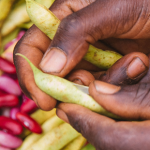Increasing temperature, erratic rainfall, and other extreme events, such as floods and droughts, pose severe threats to development in Nigeria. Climate change will have significant adverse impacts on crop production and livelihoods, making the country’s poor and disadvantaged people even more vulnerable. It is imperative that the impact of relevant climate science on agricultural production be considered, together with important cross-cutting issues that influence agricultural growth, poverty alleviation, and climate resilience—especially gender and nutrition—if the goals of Feed the Future and the Global Food Security Strategy are to be achieved. This policy note summarizes assessments of these interlinkages in the Nigerian context under GCAN.
Climate change and variability: What are the risks for nutrition, diets, and food systems?
By Jessica Fanzo, Rebecca McLaren, Claire Davis, and Jowel Choufani
The paper uses a food systems approach to analyze the bidirectional relationships between climate change and food and nutrition along the entire food value chain. It then identifies adaptation and mitigation interventions for each step of the food value chain to move toward a more climate-smart, nutrition-sensitive food system. The study focuses on poor rural farmers, a population especially vulnerable to the adverse effects of climate change on nutrition, although we recognize that there are other vulnerable populations, including urban poor and rural populations working outside of agriculture. Although this report does not explicitly exclude overweight and obesity, it focuses primarily on undernutrition because this nutritional status is currently more prevalent than overnutrition among our target population.
Policy Note on Research Priorities for Zambia
Climate change is a substantial threat to sustainable development in Zambia, a country experiencing weather hazards, drought and dry spells, seasonal and flash floods, and extreme temperatures that may well increase under climate change. Achieving the goals of Feed the Future and the Global Food Security Strategy requires careful consideration of the impact of relevant climate science on agricultural production, while at the same time considering other cross-cutting issues that influence agriculture-led poverty alleviation, resilience, and nutrition—such as gender. This policy note summarizes assessments of these linkages for Zambia under GCAN.
The challenge of our lifetime: How to ensure nutrition for everyone under climate change
By Claire Davis and Jessica Fanzo
The connections between climate change, the global food system, and nutrition are woefully under-acknowledged. Yet the agriculture-food system is particularly vulnerable to climate change. For many regions, especially in the global South, it will be more and more difficult to produce enough nutritious, safe food for everyone in the future. This relationship is complex: climate change threatens our ability to feed a growing planet, but the food system also contributes significantly to greenhouse gas emissions (GHGs).
A new IFPRI discussion paper, “Climate Change and Variability: What are the Risks for Nutrition, Diets, and Food Systems?”, examines these connections in order to provide an overview of the existing research landscape. The paper uses a food systems approach as it analyzes the bidirectional relationship between food and climate along every step of the food value chain, from a farmer’s seed supply to a consumer having a meal.
Read More...
How to ensure nutrition for everyone under climate change and variability
By Jessica Fanzo, Rebecca McLaren, Claire Davis, and Jowel Choufani
The intersection of climate change, food security, and nutrition is critical given that the growing adverse impacts of climate change threaten food security and nutrition outcomes, especially for the most vulnerable in the global South. Climate is a potential driver of nutritional status, but dietary choices can affect both nutrition and climate. A better understanding of the pathways linking climate change and nutrition is key to developing effective interventions to ensure that the world’s population has access to sufficient, safe and nutritious food. Undernutrition can be exacerbated by the effects of climate change at all stages of the food value chain. In addition, disease is affected by climate and can, in turn, increase the demand
for nutrients, while reducing nutrient absorption.


